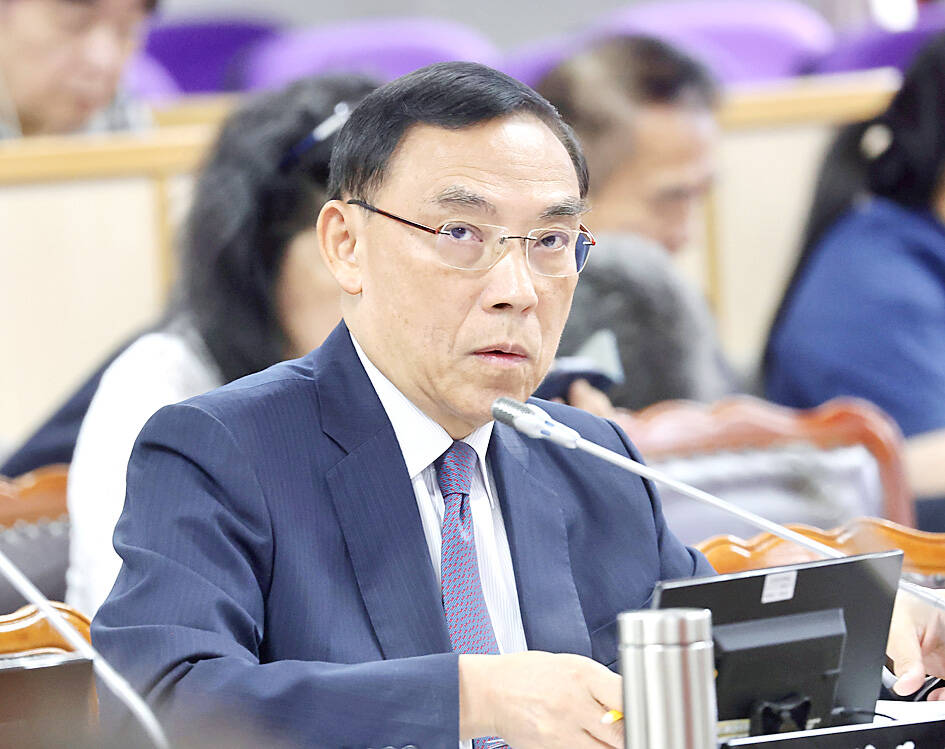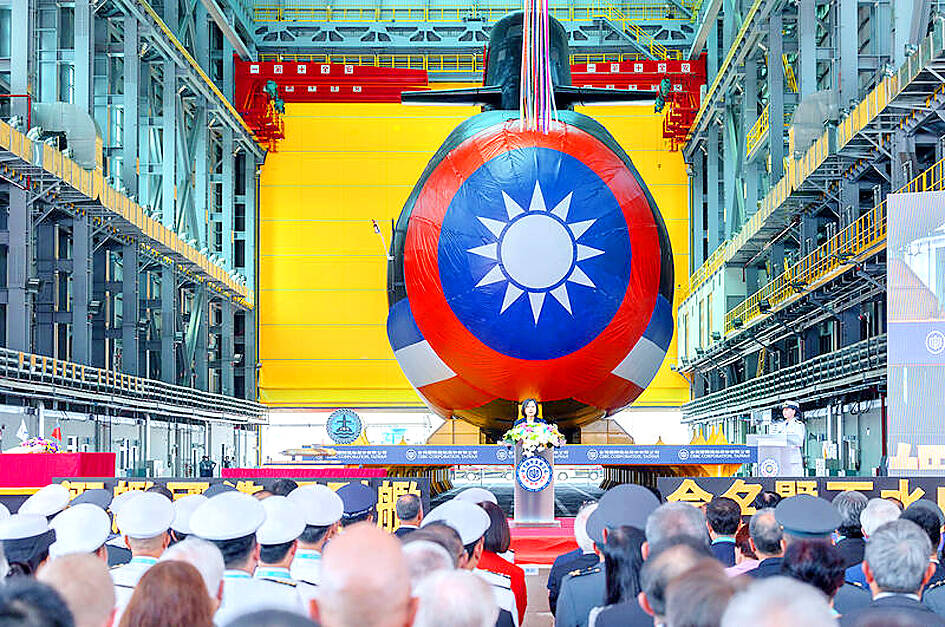Prosecutors yesterday said they are investigating accusations of interference with the nation’s submarine program and that details of it were leaked, in what would be a serious breach of national security.
Taiwan unveiled its first domestically developed submarine on Thursday last week, a major step in a project aimed at bolstering the nation’s defense and deterrence in the face of military threats from China, although it would not enter service for two years.
Indigenous Defense Submarine program head Huang Shu-kuang (黃曙光) told local media last week that lawmakers, whom he did not name, had made it “difficult” for the program to purchase critical equipment, and that a contractor who had failed to obtain a bid had forwarded information to China.

Photo: CNA
The Supreme Prosecutors’ Office, in a short statement, said that Huang’s accusations had attracted “great attention” given the national security and defense implications.
It said it had instructed prosecutors to “investigate the case as soon as possible to safeguard national security.”
Minister of Justice Tsai Ching-hsiang (蔡清祥) yesterday said that the Supreme Prosecutors’ Office and the Ministry of Justice’s Investigation Bureau are investigating the case.

Photo: EPA-EFE / Presidential Office
Following Huang’s remarks, retired navy captain Kuo Hsi (郭璽) on Thursday said that Chinese Nationalist Party (KMT) Legislator Ma Wen-chun (馬文君) was the legislator in question and had shared information with China, prompting Ma to file a slander suit against Kuo at the Nantou District Prosecutors’ Office on Saturday.
Kuo yesterday filed civil and criminal lawsuits against Ma at the Taipei District Prosecutors’ Office, accusing her of leaking confidential information about the submarine to national security agencies in other countries.
Ma yesterday asked Huang to name those he had accused.
She said that she would be willing to perform seppuku — the Japanese ritual of committing suicide by disembowelment followed by decapitation — if she had ever given confidential information to China.
The KMT supported Ma, saying she was doing her job as a lawmaker by keeping the government in check and pointing out that it made no sense to budget billions of dollars for seven submarines when the submarine prototype had not even undergone testing.
The Democratic Progressive Party could not solve a problem, so it attacked the person who pointed out the problem, KMT spokesman Lin Chia-hsing (林家興) said.
Kuo’s accusation was blatant political maneuvering, he said.
“If confidential information was really leaked [by Ma], why was it not dealt with by the judiciary earlier,” he said, adding that the issue had been brought up just before the presidential and legislative elections in January.

Auckland rang in 2026 with a downtown fireworks display launched from New Zealand’s tallest structure, Sky Tower, making it the first major city to greet the new year at a celebration dampened by rain, while crowds in Taipei braved the elements to watch Taipei 101’s display. South Pacific countries are the first to bid farewell to 2025. Clocks struck midnight in Auckland, with a population of 1.7 million, 18 hours before the famous ball was to drop in New York’s Times Square. The five-minute display involved 3,500 fireworks launched from the 240m Sky Tower. Smaller community events were canceled across New Zealand’s

The Ministry of Foreign Affairs (MOFA) yesterday said it is closely monitoring developments in Venezuela, and would continue to cooperate with democratic allies and work together for regional and global security, stability, and prosperity. The remarks came after the US on Saturday launched a series of airstrikes in Venezuela and kidnapped Venezuelan President Nicolas Maduro, who was later flown to New York along with his wife. The pair face US charges related to drug trafficking and alleged cooperation with gangs designated as terrorist organizations. Maduro has denied the allegations. The ministry said that it is closely monitoring the political and economic situation

‘SLICING METHOD’: In the event of a blockade, the China Coast Guard would intercept Taiwanese ships while its navy would seek to deter foreign intervention China’s military drills around Taiwan this week signaled potential strategies to cut the nation off from energy supplies and foreign military assistance, a US think tank report said. The Chinese People’s Liberation Army (PLA) conducted what it called “Justice Mission 2025” exercises from Monday to Tuesday in five maritime zones and airspace around Taiwan, calling them a warning to “Taiwanese independence” forces. In a report released on Wednesday, the Institute for the Study of War said the exercises effectively simulated blocking shipping routes to major port cities, including Kaohsiung, Keelung and Hualien. Taiwan would be highly vulnerable under such a blockade, because it

UNRELENTING: China attempted cyberattacks on Taiwan’s critical infrastructure 2.63 million times per day last year, up from 1.23 million in 2023, the NSB said China’s cyberarmy has long engaged in cyberattacks against Taiwan’s critical infrastructure, employing diverse and evolving tactics, the National Security Bureau (NSB) said yesterday, adding that cyberattacks on critical energy infrastructure last year increased 10-fold compared with the previous year. The NSB yesterday released a report titled Analysis on China’s Cyber Threats to Taiwan’s Critical Infrastructure in 2025, outlining the number of cyberattacks, major tactics and hacker groups. Taiwan’s national intelligence community identified a large number of cybersecurity incidents last year, the bureau said in a statement. China’s cyberarmy last year launched an average of 2.63 million intrusion attempts per day targeting Taiwan’s critical